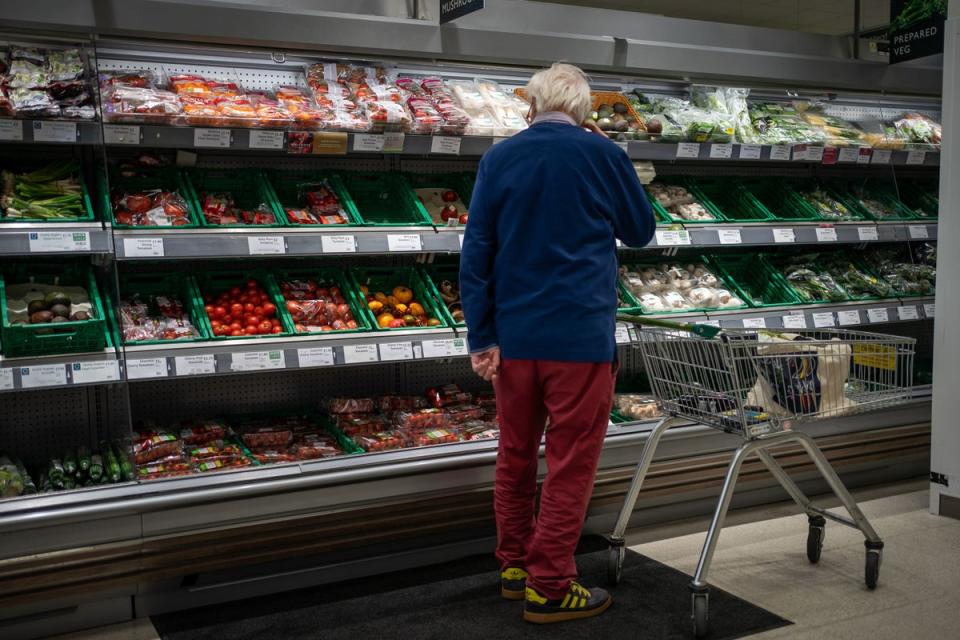Inflation jumps unexpectedly as food prices soar

Inflation jumped unexpectedly to 10.4 per cent in February as food prices rise at their highest rate for 45 years, putting pressure on the Bank of England to further raise interest rates this week.
The rate of Consumer Prices Index inflation was up from 10.1 per cent in January, the Office for National Statistics said, despite the Bank saying last month it believed inflation had peaked from its high of 11.1 per cent late last year.
Analysts still expect inflation to fall over the course of 2023 as sky-high energy bills – the main driver of inflation – start to come down with falls in gas and electricity costs.
Most economists were expecting CPI to decrease to 9.9 per cent in February and say the surprise rise was due to a shortage of vegetables pushing up the price of food, as well as alcohol prices in pubs and restaurants rising after discounting in January.
Economists had been on the fence about whether Britain’s central bank will opt for another rate rise at Thursday’s Monetary Policy Committee (MPC) meeting, following a period of instability in the global banking sector.
But many now think the MPC will increase the base rate by at least 0.25 percentage points, to 4.25 per cent from the current rate of 4 per cent, piling more pressure on borrowers.
Craig Erlam, a senior market analyst for trading company OANDA, said the inflation figures were a “crushing blow” for the Bank.
“Whatever flexibility the Bank of England may have thought it would have on Thursday was wiped out by Wednesday morning’s inflation data and once more, the topic of conversation has shifted to whether 0.25 percentage points will be enough."
He added there is “nothing that would justify a pause” in raising interest rates, “even against the backdrop of financial stability concerns and the knock-on effects of aggressive rate hikes.”
The government has set a target of halving inflation by the end of the year but economists have warned people face a “two-year living standard squeeze” as a result of tax rises and higher-than-average energy bills persisting.
After the Spring Budget was announced, The Office for Budget Responsibility (OBR) said that the UK should expect the biggest fall in living standards on record, with real households’ disposable income per person set to tumble 5.7 per cent between 2022/23 and 2023/23.
In November 2022, CPI inflation hit 11.1 per cent, the highest mark since October 1981.
Gas and electricity prices were seen to drive November’s overall rise, with food prices experiencing the largest increase since 1977 and the cost of living squeeze remains voters’ main concern.
ONS chief economist Grant Fitzner said: “Inflation ticked up in February, mainly driven by rising alcohol prices in pubs and restaurants following discounting in January.
“Food and non-alcoholic drink prices rose to their highest rate in over 45 years with particular increases for some salad and vegetable items as high energy costs and bad weather across parts of Europe led to shortages and rationing.
“These were partially offset by falls in the cost of motor fuel, where the annual inflation rate has eased for seven consecutive months.”

Alpesh Paleja, the CBI’s lead economist, said the outlook for the months ahead is “looking more benign,” but “this year will still be a high-inflation environment for both households and businesses.”
Shadow chancellor Rachel Reeves said: “The reality is that under this Tory government, families are feeling worse off and nothing is working better than it did 13 years ago.
“The cost of living crisis is still biting hard and taxes are rising, yet the government chose to use the Budget to hand a £1bn bung to the top 1 per cent.”
Chancellor Jeremy Hunt said that “falling inflation isn’t inevitable,” adding: “We recognise just how tough things are for families across the country, so as we work towards getting inflation under control we will help families with cost-of-living support worth £3,300 on average per household this year.”

 Yahoo News
Yahoo News 
